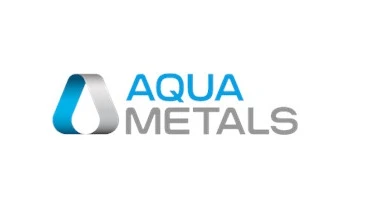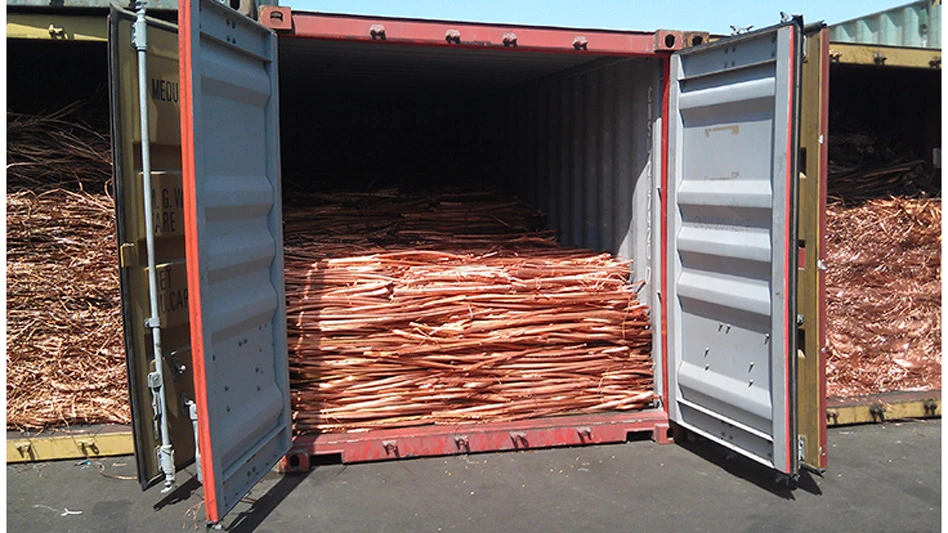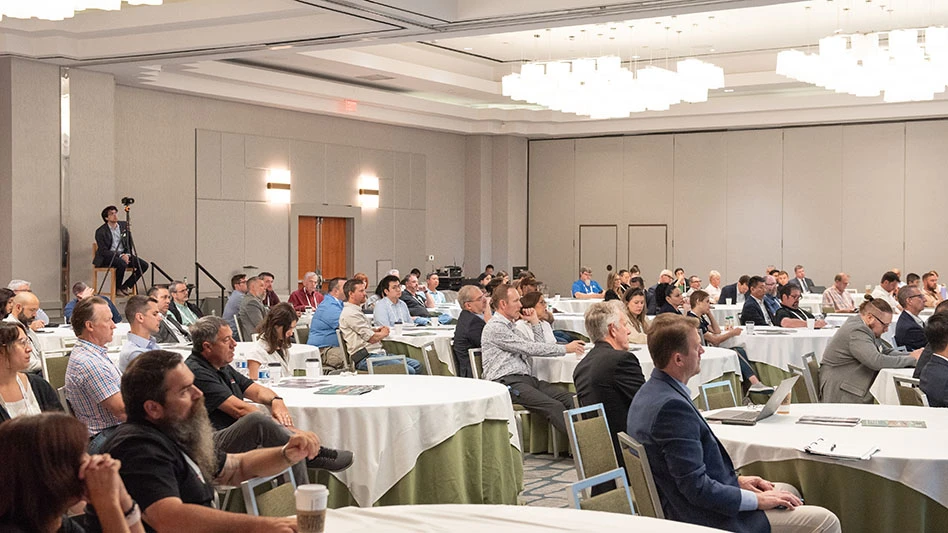 It was almost, but not quite, a case of love at first sight. When the German manufacturer of purpose-built material handling equipment, Sennebogen, brought its green line of material handlers to America in 2000, Danville, Ill.-based Mervis Industries was the first customer to take a chance on the new equipment. Jim Picillo, now vice president and COO at Mervis, remembers the event well: He was part of the team that originally met with Sennebogen and approved the purchase of the green machine for the firm’s recycling yard in Danville. He also remembers that first machine, because it’s still operating outside his Danville office.
It was almost, but not quite, a case of love at first sight. When the German manufacturer of purpose-built material handling equipment, Sennebogen, brought its green line of material handlers to America in 2000, Danville, Ill.-based Mervis Industries was the first customer to take a chance on the new equipment. Jim Picillo, now vice president and COO at Mervis, remembers the event well: He was part of the team that originally met with Sennebogen and approved the purchase of the green machine for the firm’s recycling yard in Danville. He also remembers that first machine, because it’s still operating outside his Danville office.
“I had bought machines from everyone by that time,” he recalls. “We sat down with Erich Sennebogen, and he explained the company’s concept. It was a purpose-built machine backed with sound engineering; it was obvious to us that they had thought things out and had talked to their customers.”
What's not to love?
On first inspection, Picillo and his colleagues recognized a number of small things, he says, that make the Sennebogen machines smart, durable, reliable and efficient. They could see that the green machine was a true scrap handler, in contrast to the traditional cranes or converted lumber and dirt machines that were commonly retrofitted into scrap yard applications.
However, he notes that there were a number of issues that still had to be addressed to Mervis’ satisfaction. “The magnet controller was an early solid-state model and not really reliable,” Picillo says. “We felt that the swing gear would be inadequate for our loads and duty cycles, too. The fuel economy was pretty favorable, but we had concerns about getting parts and service for the originally installed engines.”
Ha adds, “We recommended to [Sennebogen] at the time that they consider switching [to] engines that U.S. customers might be more comfortable with.”
Sennebogen’s reaction to his comments sealed the deal for Picillo, he says. “They stood behind it and made everything right,” he says. “So we knew this was a company that we wanted to partner with to resolve the issues and bring a better product to the market.”
Making improvements
Since then, Sennebogen has moved to engines that are better known to the American market. “We’re very happy they have moved to Cummins because our truck fleet is all Cummins,” Picillo says. “It’s a world-class engine that’s fuel efficient and reliable.”
Mervis Chief of Equipment Maintenance John McClatchey also is pleased with the equipment.
According to Picillo, McClatchey came to him when he heard the company was going to purchase a new scrap handler. “It’s going to be a Sennebogen, right?” he asked. “Make it Sennebogen, or I’m gonna quit! I’ve never seen a machine with so few problems.”
Picillo agrees that the green machines he helped to bring into the U.S. market have lived up to his hopes. Mervis, one of the largest recycling operations in the Midwest, now runs a fleet of Sennebogen scrap handlers in its various yards in Illinois and Indiana.
The differences between Sennebogen machines and older machines that were adapted from cranes or excavators are many, Picillo says. “The boom was developed with the stresses of our industry in mind. The outriggers and wheels create a better platform to work from on a wider footprint with 12 points of contact.” Picillo continues, “The slightly slower rpm on the swing function helps the operator stay under control—We prefer a smooth operator to a fast but out of control one.”
Easy to own
Picillo also says he appreciates the maintenance features in Sennebogen machines. He points to the control system, saying it is not complicated for machinery technicians who don’t have extensive training in electronics.
Echoing the sentiments of McClatchey, he adds that none of the machines in his fleet have ever given him a serious oil problem.
He is even impressed by the wrapping applied to hoses that are hidden out of sight in the machines. “While touring the assembly plant, I noticed them wrapping the hoses to protect them from friction wear and vibration,” he adds.
“Servicing is not an issue with Sennebogen,” Picillo says, “and it never has been. We can get anything we need, when we need it. Their dealer network is top notch—we work with both Brandeis and Howell Tractor. With people like Tom Ellis, general manager at Howell Tractor & Equipment and Gary Hirsch, vice president and general manager of Bramco MPS, Sennebogen has been represented by dealers who really understand their customers’ needs in this industry.” Picillo adds, “And we have always had a very good relationship with Jim Westlake.”
Westlake, the senior service manager for Sennebogen LLC, headquartered in Stanley, N.C., also has been part of the organization since its very beginning.
With better than 10 years of experience operating Sennebogen scrap handlers, Picillo reports that Mervis strongly prefers the machines “so we don’t have to be experts on all different types of equipment. We continue to use other manufacturers’ equipment in our fleet, but we are definitely trending greener all the time,” he says.
“It began when Erich Sennebogen took the time to visit with us, explaining his ideas and his approach,” Picillo continues. “We were impressed by his understanding and passion and we liked how we were treated from the outset.”
This case study was provided on behalf of Sennebogen LLC, Stanley, N.C. Information about the company is available at www.sennebogen-na.com.

Explore the November 2012 Issue
Check out more from this issue and find your next story to read.
Latest from Recycling Today
- USTR announces phased measures designed to address China’s shipbuilding dominance
- APR, RecyClass release partnership progress report
- Clearpoint Recycling, Enviroo sign PET supply contract
- Invista expanding ISCC Plus certification program
- Redwood partnership targets recycling of medium-format batteries
- Enfinite forms Hazardous & Specialty Waste Management Council
- Combined DRS, EPR legislation introduced in Rhode Island
- Eureka Recycling starts up newly upgraded MRF






